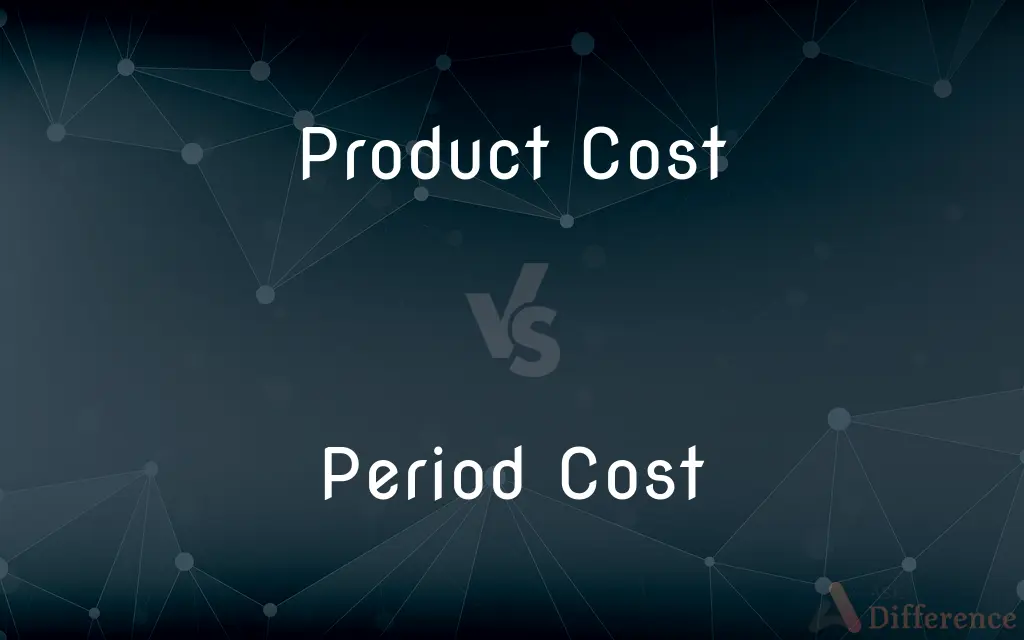Product Cost vs. Period Cost — What's the Difference?
By Tayyaba Rehman — Published on October 14, 2023
Product Cost is the total expense to produce goods, while Period Cost pertains to expenses not directly tied to production, but to a specific time frame.

Difference Between Product Cost and Period Cost
Table of Contents
ADVERTISEMENT
Key Differences
Product Cost and Period Cost delineate two diverse facets of business expenditure, each fundamentally affecting financial accounting and management differently. Product Cost refers to all the expenses directly associated with manufacturing a product, inclusive of direct materials, direct labor, and manufacturing overheads. On the contrary, Period Cost represents expenses that are not directly tied to production but are incurred in a particular time period, typically including selling, general, and administrative expenses.
The implications of Product Cost are particularly pivotal in evaluating the cost of goods manufactured and subsequently, the cost of goods sold. Product Cost is directly tied to products and impacts inventory valuation until the products are sold. Conversely, Period Cost directly impacts the profit and loss statement in the period they are incurred, regardless of the production volume, given that they are not tied to production activities but rather associated with the management and functioning of the business within a particular period.
When deciphering cost behavior in relation to production volume, Product Cost shows variable nature, meaning it fluctuates in direct proportion to the volume of goods produced. Conversely, Period Cost can be either variable or fixed, with its incurrence being independent of the production volume and is instead, associated with the specific time frame and operational aspects like marketing or management.
The methodology for allocating Product Cost and Period Cost in financial statements underscores their divergent roles in accounting. Product Costs are initially allocated to inventory and only expensed through the cost of goods sold when the related products are sold, hence affecting both the balance sheet and the income statement. In contrast, Period Costs are expensed in the period incurred, directly impacting the income statement, without influencing the balance sheet.
It is crucial to recognize that prudent management of Product Cost and Period Cost is quintessential for accurate financial reporting and insightful managerial decision-making. Astute analysis of Product Cost assists in pricing strategies, ensuring that products are priced to recoup production expenses. In comparison, meticulous management of Period Cost, such as advertising expenses, is vital to ensure that the firm efficiently utilizes resources in periods to foster growth and sustainability.
ADVERTISEMENT
Comparison Chart
Relation to Production
Directly related to production
Not directly related to production
Accounting Treatment
Capitalized to inventory initially
Expensed in the period incurred
Impact on Financials
Affects income statement upon sale
Immediately affects income statement
Nature
Variable with production volume
Can be variable or fixed
Example Components
Direct materials, direct labor
Selling expenses, administrative expenses
Compare with Definitions
Product Cost
Expenses directly assigned to product creation.
A surge in Product Cost impacted the product's market price.
Period Cost
Expenses unrelated to product manufacturing.
The rent Period Cost is recognized monthly on the income statement.
Product Cost
Sum of direct labor, materials, and manufacturing overhead.
Efficient management reduced the total Product Cost per unit.
Period Cost
Costs not assigned to inventory valuation.
The Period Cost of administrative salaries was substantial.
Product Cost
Costs directly incurred from manufacturing.
The Product Cost rose due to increased raw material prices.
Period Cost
Expenditures such as selling and administrative costs.
Management aimed to reduce the Period Cost related to advertising.
Product Cost
Financial outlay associated with manufacturing.
The Product Cost was critical in determining the selling price.
Period Cost
Costs expensed in the time period incurred.
The marketing Period Cost was allocated to this quarter's budget.
Product Cost
Cost absorbed in producing a product.
The Product Cost was analyzed for potential savings.
Period Cost
Costs associated with a specific time frame.
An unexpected Period Cost arose from a one-time legal settlement.
Common Curiosities
Can Product Cost influence pricing strategies?
Yes, understanding Product Cost is crucial for developing pricing strategies to ensure profitability.
What is a Product Cost?
Product Cost is the total expense directly related to the production of goods.
How does Period Cost differ?
Period Cost includes expenses not directly tied to production but related to a specific time period.
Does Product Cost affect inventory valuation?
Yes, Product Cost is capitalized to inventory and affects valuation until products are sold.
When is Period Cost recorded on the income statement?
Period Cost is recorded and expensed in the time period in which it is incurred.
Is Period Cost related to the volume of production?
No, Period Cost is not related to production volume and is incurred even in non-production periods.
Share Your Discovery

Previous Comparison
Bank Rate vs. Repo Rate
Next Comparison
PUSH vs. POPAuthor Spotlight
Written by
Tayyaba RehmanTayyaba Rehman is a distinguished writer, currently serving as a primary contributor to askdifference.com. As a researcher in semantics and etymology, Tayyaba's passion for the complexity of languages and their distinctions has found a perfect home on the platform. Tayyaba delves into the intricacies of language, distinguishing between commonly confused words and phrases, thereby providing clarity for readers worldwide.














































